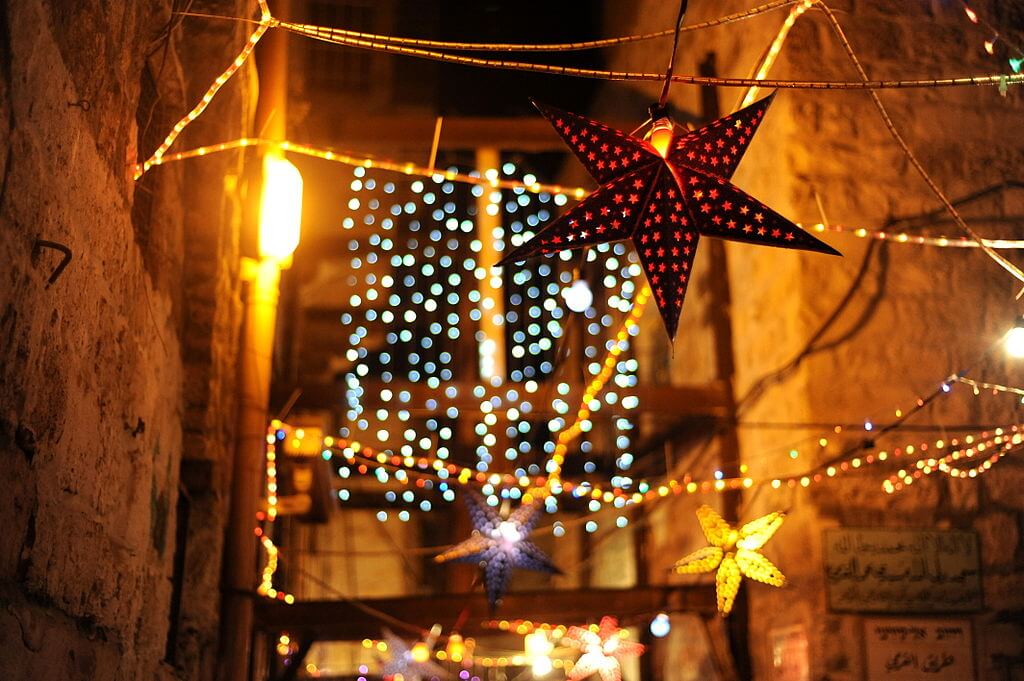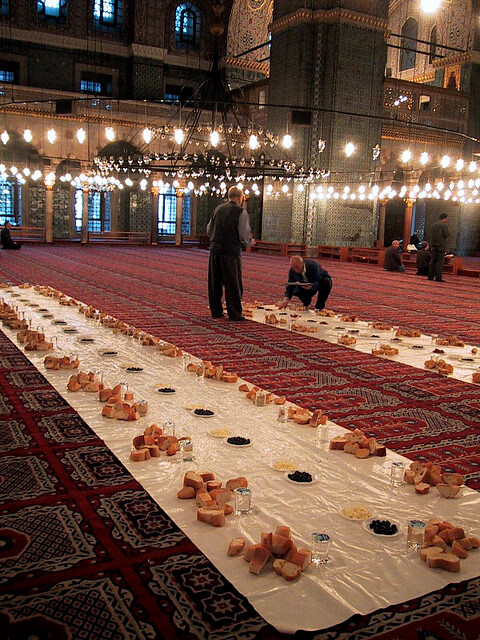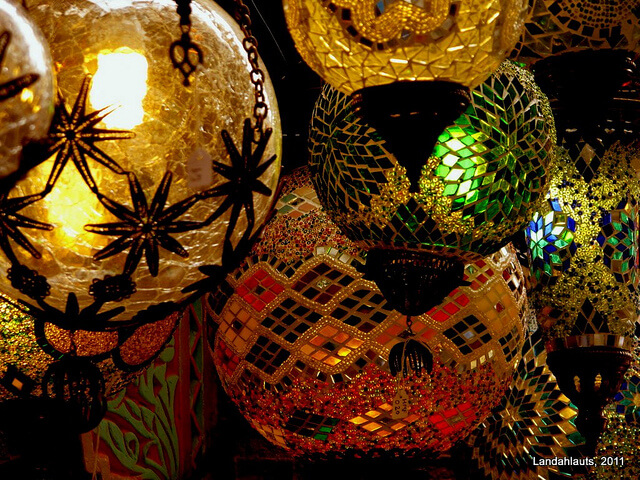
Jerusalem lights up for Ramadan. By: Guillaume Paumier.
Ramadan brings with it a communal glow for many Muslims across the globe. For me, it will be one of new beginnings; this month will be my first Ramadan away from home, and I am honestly struggling to comprehend what that will mean.
As an Arab, I have lived life never knowing what it is to have an empty fridge. This isn’t a declaration of absolute wealth or a reinforcement of my middle class status; it’s just that Arabs know how to turn whatever they have into a delectable treat.
Since getting married some months ago, I have felt an overwhelming desire to cling to tradition. But I am also put off by how much work tradition seems to entail. Apparently tradition and minimalism don’t make good bed fellows, so I frequently duck into my mum’s or mother-in-law’s house for my fix of anything remotely Arab (and occasionally to stock up my own fridge) – hboub, wara’ a’nab, mlokhiya; the list goes on. And I won’t pretend that Ramadan dining will be any different. In fact, it’s likely to be a great deal worse.
As a young, working couple, who – like good Arab children – live within the obligatory 20-minute radius from our parents’ homes, it’s safe to say that my husband and I will never dine alone this Ramadan. Unless we’re struck by the plague or a zombie apocalypse, it is almost guaranteed that we will spend every other night gathered hopefully (read, ‘pathetically’) around our parents’ dining tables, waiting to see what glorious goodies our families have to offer. This brings me enormous comfort.

A communal iftar is set up in an Istanbul mosque. By: Balavenise.
When I lived at home, we had few compulsory Ramadan traditions. There was no communal suhoor (the pre-dawn meal) because we all worked and struggled to get the necessary amount of sleep before we had to jump out of bed and serve the capitalist regime society. But the one rule my family had was this: ‘Be home for iftaar, or risk eating nothing’. I loved this. It meant that every night at sunset for an entire month, I got to spend time with my siblings and, occasionally, our extended family. Not surprisingly, this was the only time of year that regular family dining took place.
Outside of Ramadan, everyone is busy with work, university, social engagements and Sydney traffic. During Ramadan, we make a concerted effort to leave work early (with the permission of our bosses), get home on time, and spend actual quality time together. It becomes not only an important religious engagement, but also a significant family one. And with the encouragement of reflection that Ramadan brings, I realize that this is what I will miss most.
I will miss how picky my sister is about the appropriate level of sogginess to her fatteh. I will miss the collective dismissal of this concern. I will miss how my other sister always turns up 10 minutes late for iftar (the fast breaking meal) because ‘traffic’, and the way my brother thinks that a nutritious iftar consists of a Dougies burger with extra Dougies sauce.
Even if I am there every other day, the feeling of knowing that it is no longer supposed to be home, that it is not the place you return to every night – no longer your designated place of refuge – saddens me just that little bit.

Ramadan lanterns in Albayzin, Granada. By: Landahlauts
I’m sure that being a real adult means that I am supposed to start traditions of my own. Perhaps being a grown up means that I should be excited to share suhoor and other special Ramadan treats with my husband. But I’m not, because Ramadan will always be a time of community. This glorious month is a time of reflection and reconnection with our Lord, but also with those who matter most. It’s not about idle chitchat and pretending to care what your father’s third cousin’s wife has been up to. Ramadan is a time where you strip back to the bare essentials and you remind yourself and one another of everything that is good. This is the time when we are most vocally thankful for our blessings, for the privileges that have been bestowed upon us.
And in the presence of those who matter the most, Ramadan is a time when we strive to be our best selves. We ask forgiveness for our shortcomings both from God and from the people we often neglect on a daily basis – not because we don’t love them, but because we love them so much that we know they will understand.
So as the blessed month befalls us, let us be thankful for the wondrous things that have come our way, and the exceptional people – related by blood or otherwise – who embellish our lives with all the goodness they have to offer.
And if you have a spare plate of mlokhiya, I’d be happy to receive it.
By Mehal Krayem
Categories: Religion, Religion and Culture
